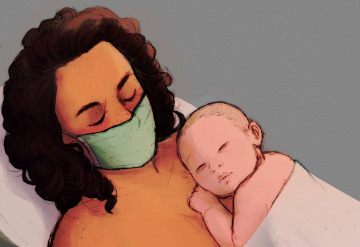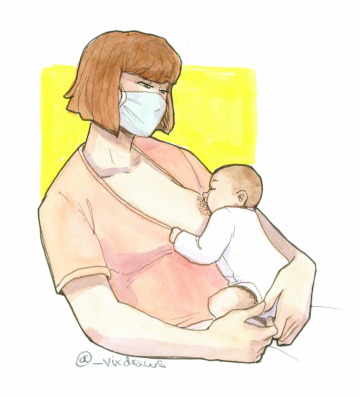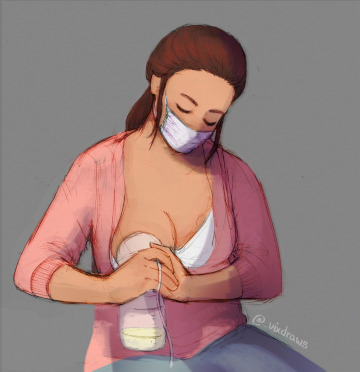

It is unlikely that CoVid-19 vaccine will get into your milk or harm your breastfeeding baby. See this statement from the Academy of Breastfeeding Medicine.
Considerations for COVID-19 Vaccination in Lactation:
https://www.bfmed.org/abm-statement-considerations-for-covid-19-vaccination-in-lactation
So far, small studies have not found the coronavirus (SARS CoV-2) that causes COVID-19 in the milk of mothers with the disease. Only one baby seems to have been born with the virus.
Human babies have very immature immune systems. Breast milk contains antibodies and other things that kill germs and strengthen baby's immune system. It is best to breastfeed with most illnesses.
During any emergency, supplies of infant formula can be disrupted. Many stores I've been to in the past few weeks have been completely sold out of formula. Formula does not provide support for the baby's immune system like human milk does.
Holding your baby skin to skin immediately after birth and breastfeeding in the first hour or two helps you make more milk than waiting to breastfeed until later.

If you are healthy when you give birth, get as much breastfeeding practice and help as you can while you are in the hospital. NYC hospitals have IBCLCs (International Board Certified Lactation Consultants) or CLCs (Certified Breastfeeding Counselors) to help you get off to a good start. Keep your baby with you in your room, and feed as often as baby asks. Early hunger signs include wiggling, moving the tongue, and bringing the hands to the mouth. Babies are more patient with learning to breastfeed when they are just a little hungry. If you need more help when you get home, many IBCLCs are doing virtual consults.

If you have symptoms that MIGHT be COVID-19 when you give birth, you should wash your hands very carefully before handling your baby or your breasts (figure 3), wear a mask while handling your baby, and while breastfeeding (figure 2) or skin to skin (figure 1).

If you DO have COVID-19 when you give birth, you might be separated from your baby in the hospital. You can still express your milk for someone healthy to give the baby until you recover. Practice the same handwashing, and wash your pump parts and other things you touch very carefully. If you are home, you can consider breastfeeding while wearing a mask and practicing careful handwashing before touching your baby. If you have been separated in the hospital, you will likely need help to transition to breastfeeding and increase your milk supply. Pumps are not as good as babies, especially in the first week! Many IBCLCs are offering virtual consultations to help you.
If you are already breastfeeding and get ill, your baby has already been exposed and you already have antibodies in your milk. It's wise to continue breastfeeding and to practice careful handwashing and wear a mask while handling your baby. Someone who is not ill can change diapers and cuddle baby so you can get some extra rest.
If you are still pregnant, learn how to express milk with your own hand. See links in Links for Parents. This works better in the first few days if your baby is separated from you. Keep any drops you get (ask your nurse for a sterile container) to spoon or syringe feed your baby. The more often you express in the first 3 days, the more milk you will make.
If you want to read the official statements of various professional organizations, here they are:
Academy of Breastfeeding Medicine
La Leche League
United States Breastfeeding Committee
US Centers for Disease Control and Prevention
World Health Organization
Thanks to Laura @_vixdraws for the beautiful drawings.

